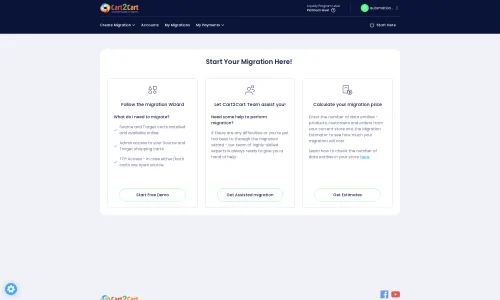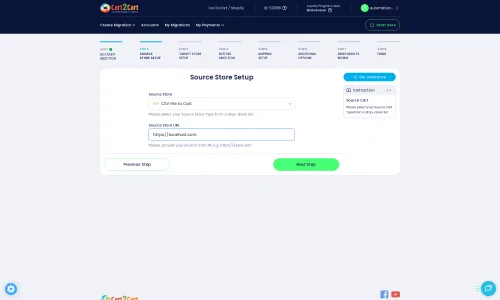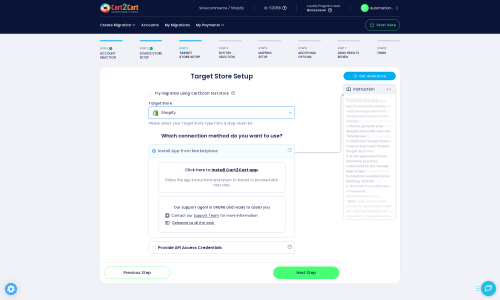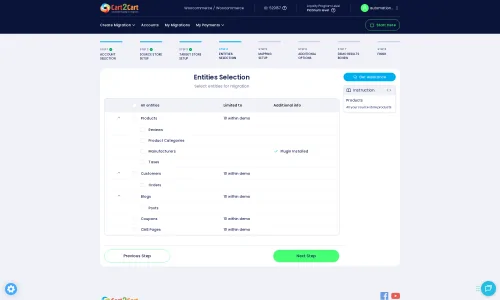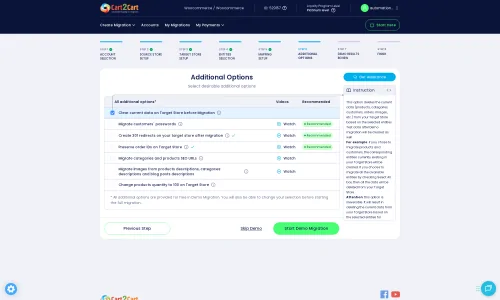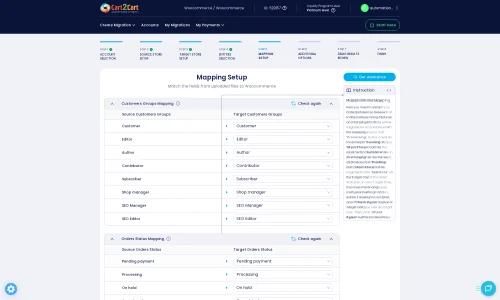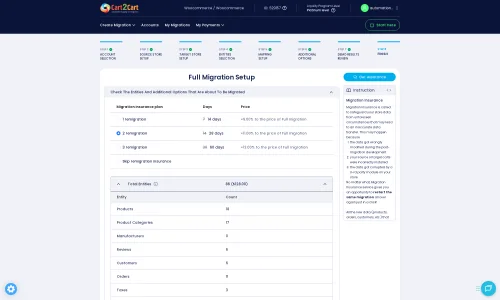JShop to Shopify Migration - Step-by-Step Guide & Expert Services
JShop to Shopify migration made simple and secure. Cart2Cart ensures you can confidently move JShop store to Shopify, experiencing a seamless switch from JShop to Shopify. Our powerful service expertly transfers all your valuable data, preserving SEO rankings, ensuring zero downtime, and guaranteeing top-tier security. Whether you seek a comprehensive step-by-step guide for DIY control or prefer our expert team to handle your entire JShop to Shopify migration, we provide the perfect solution for your business.
What data can be
migrated from JShop to Shopify
-
Products
-
Product Categories
-
Manufacturers
-
Customers
-
Orders
Estimate your Migration Cost
To calculate your JShop to Shopify migration price, click the button below. The migration price depends on the number of data types and the additional migration options selected.
How to Migrate from JShop to Shopify In 3 Steps?
Connect your Source & Target carts
Choose JShop and Shopify from the drop-down lists & provide the stores’ URLs in the corresponding fields.
Select the data to migrate & extra options
Choose the data you want to migrate to Shopify and extra options to customise your JShop to Shopify migration.
Launch your Demo/Full migration
Run a free Demo to see how the Cart2Cart service works, and when happy - launch Full migration.
Migrate JShop to Shopify: The Definitive Guide for a Seamless Transition
A Comprehensive Guide to Transitioning from JShop to Shopify
Replatforming an e-commerce store is a significant undertaking, but it often paves the way for enhanced growth and operational efficiency. If you're looking to move your online business from JShop to Shopify, you're choosing a robust, scalable, and user-friendly platform known for its extensive app ecosystem and powerful sales tools. This detailed guide will walk you through the entire process, ensuring a smooth transition of your valuable data and a minimal impact on your current operations.
Since JShop is not directly supported by automated migration tools, this guide will focus on leveraging a CSV file export from your JShop store to facilitate the data transfer to Shopify, using a trusted migration service like Cart2Cart.
Prerequisites for Migration
Before embarking on your store migration journey, it's crucial to prepare both your existing JShop store and your new Shopify environment. Proper preparation is key to ensuring data integrity and a seamless transition.
For Your JShop (Source) Store:
- Export Data to CSV Files: As JShop isn't directly integrated with automated migration tools, you'll need to export your store's data into CSV (Comma Separated Values) files. This includes essential entities such as products (with SKUs, variants, descriptions, images), product categories, customer records, orders, product reviews, CMS pages, and blog posts. Ensure your CSVs are well-formatted and contain all necessary information. For more detailed guidance, refer to our CSV.File Data Migration service.
- Data Review and Cleanup: Before exporting, take this opportunity to clean up any outdated or redundant data. This includes old product listings, inactive customer accounts, or duplicate entries. A clean dataset will result in a more efficient and accurate migration.
- Backup Your Data: Always create a complete backup of your entire JShop store data before starting any migration process. This safeguards your information in case of unforeseen issues. You can find more information on preparing your source store here: How to prepare Source store for migration?.
For Your Shopify (Target) Store:
- Set Up a New Shopify Store: If you don't already have one, create a new Shopify store. Familiarize yourself with its basic dashboard and settings.
- Install Cart2Cart Store Migration App: Shopify requires the installation of the Cart2Cart Store Migration App to facilitate the data transfer. This app enables a secure and efficient connection between the migration service and your Shopify store.
- Disable Notifications: During the migration process, it's highly recommended to disable email notifications on your Shopify store to prevent customers from receiving irrelevant updates or test order confirmations.
- Understand Shopify Limitations: Be aware that Shopify's 'Pause and Build' plan blocks order processing, and product reviews on Shopify typically require a third-party app like AirReviews to be fully functional after migration. Also note that there might be country restrictions for certain orders. Learn more about target store preparation: How to prepare Target store for migration?.
Performing the Migration: A Step-by-Step Guide
With your preparations complete, you're ready to initiate the data transfer from your JShop CSV files to Shopify. Follow these steps carefully:
Step 1: Start Your Migration Wizard
Navigate to the Cart2Cart website and begin the migration process. You'll typically start by clicking a prominent 'Start Migration' or 'Migrate Now' button to launch the interactive migration wizard.
Step 2: Connect Your Source Store (JShop via CSV)
In the migration wizard, you will first configure your source store details. Since JShop is not a directly supported platform, you'll select 'CsvToCart' as your source shopping cart from the dropdown list. You will then be prompted to upload your prepared CSV files containing your JShop store's data.
The `CsvToCart` method supports the migration of a wide array of data entities, including Products, Product Categories, Product Manufacturers, Product Reviews, Customers, Orders, Invoices, Taxes, Stores, Coupons, CMS Pages, and Blog Posts. Ensure all your relevant JShop data is accurately represented in the CSVs you upload.
Step 3: Connect Your Target Store (Shopify)
Next, you'll configure your target store. Select 'Shopify' from the list of available shopping carts. The recommended and most straightforward connection method is to 'Install App from Marketplace'. You will be provided with a link to the Shopify App Store to install the Cart2Cart Store Migration App. Follow the on-screen instructions in Shopify to complete the app installation, then return to the migration wizard.
Alternatively, you can choose to 'Provide API Access Credentials' if you prefer a manual setup. This involves creating a custom app in your Shopify admin and configuring the necessary API scopes to generate an access token. For detailed instructions on API credentials, refer to The Short & Essential Guide to Access Credentials for Cart2Cart.
Step 4: Select Data Entities for Migration
At this stage, you'll specify which types of data you want to transfer from your JShop CSVs to Shopify. You can choose to migrate 'All entities' with a single click or select specific data types individually. Shopify supports the migration of Products, Product Categories, Product Reviews, Customers, Orders, CMS Pages, Gift Cards, Coupons, Price Rules, Blogs, and Blog Posts.
Carefully review the list and select all relevant data to ensure your new Shopify store is fully populated with your existing content and customer information.
Step 5: Configure Additional Migration Options
This crucial step allows you to fine-tune your migration with various optional features. Consider these important options:
- Clear Target Store Data: This option allows you to remove any existing data in your Shopify store before the migration, ensuring a clean slate. Read more about this here: Clear current data on Target store before migration option.
- Preserve Order IDs, Customer IDs, Product IDs: These options are vital for maintaining consistency, especially if you rely on specific IDs for accounting, inventory management, or customer service. Learn more about How Preserve IDs options can be used?.
- Migrate Images in Description: Ensure that all product images embedded within descriptions are transferred correctly.
- Create 301 SEO URLs: This is critically important for preserving your existing search engine rankings and link equity. It ensures that old URLs from your JShop store automatically redirect to the new corresponding URLs on Shopify, preventing broken links and maintaining your SEO value.
- Migrate Product Reviews: Remember that Shopify requires a third-party app (like AirReviews) to fully support product reviews. Ensure you account for this in your post-migration setup.
Step 6: Map Data (if applicable)
The mapping setup allows you to match specific data fields from your source JShop CSVs to their corresponding fields in Shopify. This is particularly important for customer groups and order statuses. For example, you can map 'Pending' status from JShop to 'Pending Payment' in Shopify, or a custom customer role from JShop to a standard Shopify customer tag. Accurate data mapping ensures consistency and usability of your transferred data.
Step 7: Run a Free Demo Migration
Before committing to a full migration, run the free demo migration. This transfers a limited number of entities (e.g., 10 products, 10 customers, 10 orders) to your Shopify store. The demo serves as a crucial verification step, allowing you to preview how your data will appear on the new platform. Thoroughly review all migrated data to ensure accuracy and proper formatting. If you encounter any issues, you can adjust settings before the full transfer. Consider our Migration Preview Service for expert assistance with this step.
Step 8: Initiate Full Migration
Once you're satisfied with the demo results, proceed with the full migration. This will transfer all selected data entities from your JShop CSVs to your Shopify store. During this final step, you'll also have the option to select a Migration Insurance Service, which provides a certain number of re-migrations within a specified period, offering peace of mind. For more details, see How Migration Insurance works?.
Post-Migration Steps
Completing the full migration is a significant milestone, but the process doesn't end there. Several critical post-migration tasks are essential to ensure your new Shopify store is fully operational, optimized, and ready for your customers.
- Thorough Data Review: Meticulously review all migrated data on your Shopify store. Check product listings, images, variants, SKUs, pricing, product descriptions, customer accounts, order histories, and CMS pages. Verify that all information has been transferred accurately and completely.
- Test All Store Functionality: Conduct extensive testing of your Shopify store's core functionalities. This includes the entire checkout process, payment gateways, shipping calculations, customer login and account management, search functions, and all contact forms. Place a few test orders to ensure a smooth user experience.
- Configure SEO Settings and Redirects: The 301 redirects you set up during migration are vital for preserving your SEO rankings. Verify that these redirects are working correctly. Submit a new sitemap to Google Search Console and update any analytics tracking codes (e.g., Google Analytics). Maintain your link equity by ensuring no broken links.
- Install and Configure Essential Apps: Shopify's strength lies in its app ecosystem. Install and configure any necessary apps to replicate functionalities from your JShop store or to enhance your new Shopify experience. This might include apps for product reviews, advanced analytics, marketing automation, or specific payment gateways.
- Update DNS Records: Once you're confident that your Shopify store is fully functional and optimized, update your domain's DNS settings to point to your new Shopify store. This step makes your new store live to the public.
- Inform Your Customers: Announce your new store and its new home to your customer base. This can be done via email newsletters, social media, and on your old JShop site before the DNS switch.
- Monitor and Optimize: Continuously monitor your new Shopify store's performance, including website traffic, sales conversions, and user behavior. Use this data to make ongoing improvements and optimizations.
- Consider Post-Migration Services: If you receive new orders or customer sign-ups on your old JShop store after the initial migration, consider using a Recent Data Migration Service to transfer this new data. If you require further adjustments or data transfers, the Cart2Cart Remigration Service is also available.
Ways to perform migration from JShop to Shopify
Automated migration
Just set up the migration and choose the entities to move – the service will do the rest.
Try It Free
Data Migration Service Package
Delegate the job to the highly-skilled migration experts and get the job done.
Choose Package

Benefits for Store Owners

Benefits for Ecommerce Agencies
Choose all the extra migration options and get 40% off their total Price

The design and store functionality transfer is impossible due to JShop to Shopify limitations. However, you can recreate it with the help of a 3rd-party developer.
Your data is safely locked with Cart2Cart
We built in many security measures so you can safely migrate from JShop to Shopify. Check out our Security Policy
Server Security
All migrations are performed on a secure dedicated Hetzner server with restricted physical access.Application Security
HTTPS protocol and 128-bit SSL encryption are used to protect the data being exchanged.Network Security
The most up-to-date network architecture schema, firewall and access restrictions protect our system from electronic attacks.Data Access Control
Employee access to customer migration data is restricted, logged and audited.Frequently Asked Questions
Will my JShop store experience downtime during migration to Shopify?
What factors influence the cost of migrating my store from JShop to Shopify?
How long does a full data migration from JShop to Shopify typically take?
Should I use an automated tool or hire an expert for JShop to Shopify migration?
How can I prevent losing SEO rankings when migrating from JShop to Shopify?
How can I verify data accuracy after migrating from JShop to Shopify?
Will my JShop store's design and theme transfer directly to Shopify?
How is my data secured during the JShop to Shopify migration process?
What data entities can be migrated from JShop to Shopify?
Can customer passwords be migrated from JShop to Shopify?
Why 150.000+ customers all over the globe have chosen Cart2Cart?
100% non-techie friendly
Cart2Cart is recommended by Shopify, WooCommerce, Wix, OpenCart, PrestaShop and other top ecommerce platforms.
Keep selling while migrating
The process of data transfer has no effect on the migrated store. At all.
24/7 live support
Get every bit of help right when you need it. Our live chat experts will eagerly guide you through the entire migration process.
Lightning fast migration
Just a few hours - and all your store data is moved to its new home.
Open to the customers’ needs
We’re ready to help import data from database dump, csv. file, a rare shopping cart etc.
Recommended by industry leaders
Cart2Cart is recommended by Shopify, WooCommerce, Wix, OpenCart, PrestaShop and other top ecommerce platforms.



